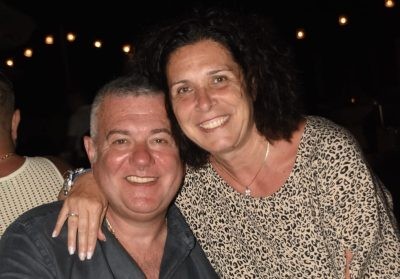
Apart from the usual differences in education, character, family, a singularity immediately emerged. He, a “Sunday Catholic”, grew up in a very religious family. She is a New Apostolic Member, a Christian denomination that initiated in Germany in 1863. The website reads: – “New Apostolic Christians believe in the Trinity of God, in Jesus Christ as God made man, in his sacrificial death and resurrection. The goal of faith is to be united to Christ at the moment of his return that has been promised.”
From the beginning the relationship between Leonardo and Simona was not easy. Simona explains, “We found it difficult to dialogue on topics concerning the difference in doctrine, the attendance of functions, and it was difficult to welcome each other in diversity.” Leonardo told us “In addition to the dissimilarities with the New Apostolic Church regarding the cult of Saints, that priests are married, that Our Lady is not a point of reference, the conflicts were generated by the need to be normal like everyone else. In fact, it was due to prejudice because today our strength lies in diversity.”
Participation at Sunday rites was impossible, “even an Our Father became difficult to recite together and in fact there was a disunity that could be cut with a knife because we were no longer nourishing our souls. We felt empty, like whitewashed sepulchres. We went into a crisis because we couldn’t find a way to build communion between us.”
Even the choice of religious education of our children was not easy, in which religion should we educate and baptize them? “Each of us,” Simona continues, “would have liked to baptize them in their own Church. Our sentiments were put to the test but by reaching out and losing our convictions to cushion friction, led us to choose Baptism in the Catholic Church.”
“I really wanted our daughters to receive their First Communion and Simona agreed to this with so much love; she also participated many times at the Catholic Mass on a Sunday. Having been satisfied in this wish made me realise how much Simona loved me, and how much she was giving up for me. At that moment I felt joy and gratitude, our love was strengthened, and I made the decision to help her follow her beliefs in the future by accompanying her to the New Apostolic Church whenever possible. I am happy and I thank God that I love and live with a Christian bride.”
The turning point happened at Grottaferrata. Mutual friends invited them to a meeting of the Focolare Movement, where Ecumenism is at home and where there were members belonging to other Christian churches. “I believe,” Leonardo comments, “that beyond our differences, we were looking for a way to be a WE, which we could not find on our own. The love between us was there and was the catalyst for our union.”
“The members of the Focolare Movement welcomed us, mysteriously embraced us, and the spirituality of unity made us experience the “Ut Omnes Sint” ‘that all may be one’. “I finally felt,” Simona adds, “that I had found a place where I was accepted for who I am, I could speak freely and feel respected. Now I had the ‘courage‘ to also express myself with Leonardo, I began to feel understood, and we rediscovered reciting together the Our Father, the prayer that unites us.”
After 16 years of civil marriage, they were married in the Catholic Church and celebrated their twenty-fifth anniversary in the New Apostolic Church. Their commitment and attention to the local community continues. Leonardo is an entrepreneur of a company specializing in industrial painting respecting the environment, Simona, after working for a period with her husband in the same company, is now a full-time mother and grandmother.
www.focolariitalia.it – Aurelio Molè

